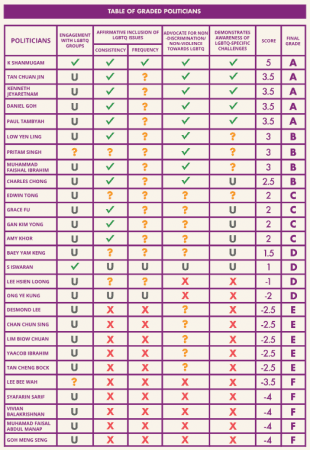It's 2020 and the lesbian, gay, bisexual, transexual and queer (LGBTQ) community continues to face discrimination on various grounds, as basic as seeking equality, de-criminalising sex between the same gender, transgender healthcare policies and more. In Singapore, the LGBTQ community is systematically discriminated against and treated as "second-class citizens", adding to their challenges in the society.
The members of the LGBTQ community have been fighting for their rights since the 2011 general elections when a joint letter was sent to 6 political parties seeking clarity on LGBTQ-related issues. To determine how the views of politicians have changed in the last decade, a gay rights group released a scorecard where it grades Singapore politicians.
![[Representational image] LGBTQI flag](https://data1.ibtimes.co.in/en/full/657712/lgbtqi-flag.jpg?h=450&l=50&t=40)
The politicians were graded based on their views of four topics:
- Engagement with LGBTQ groups
- Positive inclusion of LGBTQ issues in policies and law, and how consistent or frequent this is demonstrated
- Advocacy against discrimination or violence towards LGBTQ individuals
- Demonstration of awareness of the specific challenges that LGBTQ people face
For the grading process, Sayoni reached out to all political parties, but all except the Workers' Party was unresponsive. Out of over 100 politicians, only 35 made statements on LGBTQ issues in the last decade. Based on these views, the gay rights group graded politicians from A to F. The report identified that 8 politicians as fence-sitters who had neutral views on the LGBTQ issues.

Out of 27 politicians in the grading table, only five got an A but Law and Home Affairs Minister K Shanmugam scored a perfect 5 while others got 3.5 each. Tan Chuan-Jin of People's Action Party and Professor Paul Tambyah, chairman of the Singapore Democratic Party got an A on the LGBTQ scorecard.
![[Representational Image] LGBTQ parade](https://data1.ibtimes.co.in/en/full/599685/lgbtq-parade.jpg?h=450&l=50&t=40)
Questionable grading process
If the politician offered positive support, it fetches one point, half a point for partial support, -1 for negative action and 0 points for no explicit stand. Even with such relaxed grading system and parameters, it is shocking to see that some politicians got an F on the scorecard. But the entire grading system seems questionable as it sets the bar too low for politicians in light of the LGBTQ issues.
The politicians that scored an A had simply spoken about "basic things like how LGBT people shouldn't be physically assaulted," an activist Kristen Han said in a tweet.
"A powerful minister writing an FB status on 'inclusion' is not a positive action/change. Acknowledging that a vulnerable oppressed group faces challenges is not a positive action/change. Saying an oppressed group should Not be killed is NOT POSITIVE ACTION/CHANGE," (sic) tweeted Nabilah Husna, criticizing how little is being done for the LGBTQ community to be applauded.
Shouldn't there be a grading process based on the actions taken by politicians favourable to the LGBTQ community? Shouldn't people in higher positions be held accountable?

















